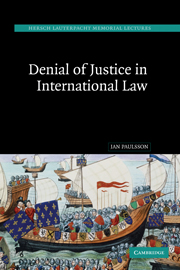Book contents
- Frontmatter
- Table of Contents
- Acknowledgements
- Authorities
- Abbreviations
- 1 The renaissance of a cause of action
- 2 The historical evolution of denial of justice
- 3 Three fundamental developments
- 4 The modern definition of denial of justice
- 5 Exhaustion of local remedies and denial of justice
- 6 Denial of justice by outside interference
- 7 Denial of justice by the decision-maker
- 8 Remedies and sanctions
- 9 The menace of ‘obscure arbiters’?
- Bibliography
- Index
8 - Remedies and sanctions
Published online by Cambridge University Press: 29 July 2009
- Frontmatter
- Table of Contents
- Acknowledgements
- Authorities
- Abbreviations
- 1 The renaissance of a cause of action
- 2 The historical evolution of denial of justice
- 3 Three fundamental developments
- 4 The modern definition of denial of justice
- 5 Exhaustion of local remedies and denial of justice
- 6 Denial of justice by outside interference
- 7 Denial of justice by the decision-maker
- 8 Remedies and sanctions
- 9 The menace of ‘obscure arbiters’?
- Bibliography
- Index
Summary
General principles: restitutio, damnum emergens, lucrum cessans
Traditionally, the issue of reparation was central to the subject of denial of justice. It was the very objective of the exercise of diplomatic protection. Yet the International Law Commission's rapporteur on Diplomatic Protection, Professor John Dugard, made it clear in his First Report that his work would include no attempt to formulate principles of reparation, but rather defer to the ILC Articles on State responsibility. Articles 34–36 of the ILC Articles provide:
34. Forms of reparation
Full reparation for the injury caused by the internationally wrongful act shall take the form of restitution, compensation and satisfaction, either singly or in combination, in accordance with the provisions of this Chapter.
35. Restitution
A State responsible for an internationally wrongful act is under an obligation to make restitution, that is, to re-establish the situation which existed before the wrongful act was committed, provided and to the extent that restitution:
is not materially impossible;
does not involve a burden out of all proportion to the benefit deriving from restitution instead of compensation.
36. Compensation
The State responsible for an internationally wrongful act is under an obligation to compensate for the damage caused thereby, insofar as such damage is not made good by restitution.
The compensation shall cover any financially assessable damage including loss of profits insofar as it is established.
These Articles are important, and will inform any current discussion of remedies under international law.
- Type
- Chapter
- Information
- Denial of Justice in International Law , pp. 207 - 227Publisher: Cambridge University PressPrint publication year: 2005

